|
|
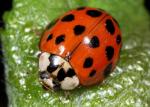
|
Harlequin
|
|
Special features: This is a recent arrival in the UK. Harmonia axyridis, which is variously called the Harlequin ladybird or the Multi-coloured ladybug, or the Asian ladybird, is a threat to many of our native insects, including butterflies, lacewings and many other ladybirds. |
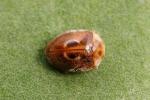
|
Inconspicuous
|
|
Special features: Inconspicuous Ladybirds (Clitostethus arcuatus) vary in colour from light to dark brown. On the wing casings there is a cream coloured mark resembling an archery bow, which is where this ladybird gets its scientific name "arcuatus". |
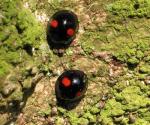
|
Kidney-Spot
|
|
Special features: Black body with two large red spots on each wing casing. The antennae and underside are orange. The wing casings have a distinctly flattened flange all the way round. |
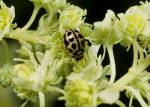
|
Micraspis 16-punctata
|
|
Special features: Several of the black spots merge together. The wing casings are a mustard yellow colour. Often found in large groups. |
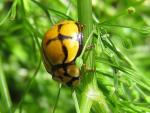
|
Netty Ladybird
|
|
The beetle is lemon-yellow in colour, with black lines on its wing-covers resembling network pattern. |
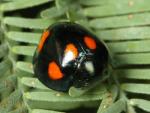
|
Orcus australasiae
|
Orcus australasiae
Body length 5mm
The ladybird beetle is dark green in colour with six orange dots on wings cover. |
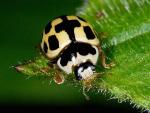
|
Propylea 14-punctata
|
|
Special features: The wing casings can vary in colour from creamy-yellow to almost black. The spots tend to be more square than round. |
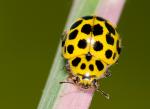
|
Psyllobora 22-punctata
|
|
Special features: Each wing case features 11 evenly spaced black spots. The pronotum, or section between the head and the abdomen, also features 5 black spots, so it probably should have been called the 27 spot ladybird. |
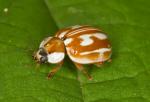
|
Striped
|
|
Special features: Striped ladybirds have red-brown wing casings with up to 15 cream coloured streaks and spots. On the pronotum, just above the eyes, there is a faint brown M-shaped marking. |
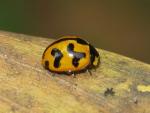
|
Transverse Ladybird
|
|
Identification
The Transverse ladybirds is bright orange-red in colour with black markings on their back. There is a dark strip down the centre where the wings meet, and prominent V-shaped markings on each side. They are active during the day and adults and larvae can be found living on the same food plants. |
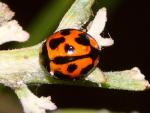
|
Variable Ladybird
|
|
Identification
The Variable Ladybird is a small beetle with four spots on each wing. They are orange or orange-yellow. Usually the spots are quite large blotches, but sometimes the spots are quite small. They are active during the day and adults and larvae can be found living on the same food plants. |

|
Water Ladybird
|
|
Special features: Water ladybirds are oval in shape. During the spring and early summer Water ladybirds have an orange pronotum and wing casings with around 19 black spots. From late summer until the following spring the wing casings and pronotum are more beige coloured with black spots. |
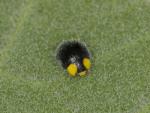
|
Yellow-shouldered Ladybird
|
Identification
The Yellow Shouldered Ladybird is a small black beetle with a yellow patch on each side of the thorax. Some also have yellow on the head. The wings are covered with fine hairs. The pupae are oval shaped and mostly white with brown markings near each end. |
|
|